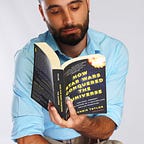Whatever I say after this point might in fact trigger some readers out there, but seeing how my opinions have always been put under scrutiny, and this podcast is where I express my concerns when it comes to matters in the industry, I stand by everything that I say.
I am utterly enraged by what I keep reading day in and day out about political correctness, inclusion, and whatever else people want to bitch about when it comes to cinema or television, whether it be in America or in Lebanon.
We have now come to a point where people are counting how many lines of dialogue are in a script about gender, film festivals and award ceremonies are excluding films that don’t include all forms of race, religion, sexual identity, etc., and I for one cannot accept that this is happening.
Let me preface this by saying that I am a minority.
For as long as I can remember, writers across the globe and across history have always been taught to a) write what you know and more importantly b) be honest and truthful in your writing.
That’s what I was taught while studying Screenwriting and I would get reminders of that all the time from my teachers.
This becomes problematic when a new writer in today’s world wants to write a narrative and break into the industry but that narrative doesn’t fit into the exclusive narratives that the industry now requires.
I say exclusive because it definitely comes off that way: Oh, the lead isn’t a woman — how sexist! There are no LGBT characters — how homophobic! No people of color — racist!
If I want to make it in Hollywood, I need to make sure that my film has people of minority, has female characters that speak as much as males, and has to include a spectrum of sexual identities.
Yet, if none of these fit the narrative that I happen to be writing…tough.
This cannot be what the industry is turning into!
All the great stories of our time were stories that touched, challenged, and felt real.
In my learned opinion, by forcing writers to include every equation of character trope in their narrative, so that nobody will be offended, or feel left out, we will end up with a monochrome archive of films where perspective and uniqueness is extinct.
How are we supposed to learn about a new experience, or perspective if all content is spewing the same thought, view, opinion, and experience?
Isn’t diversity the thing we’re fighting for? Or does diversity of thought not count?
I say this seeing what has happened with story-lines in most Lebanese productions.
Lebanon is a country filled with different religions, politics, experiences, sexual identities; it’s a melting pot of cultures and social groups.
And yet, writers here create neutral characters that have no form of religion or identity, that speak the same way, move the same way, almost puppet like.
Most television shows deal with the same redundant story-lines of love triangles, affairs, and families, but add nothing new to those narratives, because we must stay neutral in order not to offend anyone.
Characters have to have names free of religious link, yes in Lebanon a name can at once categorize you religiously speaking, because that way, no one is offended and producers can sell to the Arab countries.
All this is at the cost of good story-telling and our industry is dying.
In David Bordwell and Kristin Thompson’s book Film Art they state, “Films communicate information and ideas, and they show us places and ways of life we might not otherwise know.”
How can film and television continue to do this, if the industry forces us writers to include all their requirements, even if they don’t all fit into the narrative?
Are writers supposed to now look for tales that include everyone? Or are they supposed to force characters and situations upon their narratives and to hell with perspective and honesty?
Where would Schindler’s List, Topaz, West Beirut, Philadelphia, The Passion of the Christ, Moonlight, Capernaum be if it weren’t for honest storytelling?
They may not be the greatest films, they may have offended some people, but they exist because someone wanted to tell that particular story.
I have always been proud of this God given gift of words, and have always said that what I love most about it, is being able to give voice to those who don’t have it, but that doesn’t mean that every story I write will include every single one of those without a voice.
I guess what I am trying to say is, storytelling cannot and should not ever be censored nor should it pander to political correctness — the new age censorship.
We, as human beings, have survived with this wondrous gift. Our ancestors had only stories as entertainment, and culture.
We cannot let go of this art form and give it over to political correctness, if we do then cinema will have truly died and monochrome, monotone, dull films are what we will be left with.
Write what you know. Be honest. You cannot please everybody.
